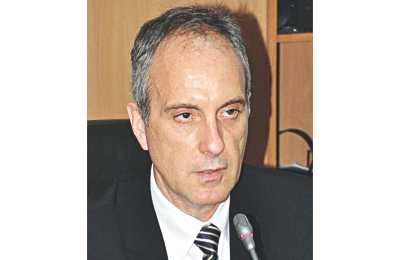IMF cautions central bank on new banks, economic stress
 David Cowen
David Cowen
Bangladesh Bank must proceed cautiously in issuing licences for new banks, a top official of the International Monetary Fund said yesterday.
"The central bank should enforce stricter licensing criteria in considering any application for a new bank," said David Cowen, IMF mission chief for Bangladesh, Asia and Pacific Department.
“Bangladesh Bank should ensure that it has the resources it needs to properly supervise and regulate all the banks, including possible new banks on the list,” he said.
The central bank should also ensure that the liquidity conditions are supportive in allowing new entrants into the market, Cowen told reporters at the Bangladesh Bank headquarters, before wrapping up his 10-day visit to Bangladesh.
Recently, the central bank has granted permissions to set up nine banks in the country, apparently bowing down to political pressure.
At present, 47 public, private and foreign banks are already operational in the country, although only about 8 percent of the population is covered by financial institutions.
His comments came as Bangladesh Bank received $141 million from the IMF under its extended credit facility (ECF). The loan is the first instalment of $987 million that Bangladesh will receive in the next three years from the Washington-based lender to overcome macroeconomic pressures.
The five-member delegation also discussed the upcoming budget for 2012-13 fiscal year with key ministers and government officials, an IMF official told The Daily Star.
Cowen said macroeconomic pressures in Bangladesh have intensified, necessitating policy adjustments and reforms to preserve macro-stability and bolster growth and poverty reduction efforts.
He said the finance ministry and the central bank have been proactive in dealing with the macroeconomic pressures.
The ECF-supported programmes will help restore macroeconomic stability, strengthen the external position and engender higher, and allow more inclusive growth, he added.
He also said the gross domestic product of Bangladesh would grow at 5.5 percent in 2011-12.
The estimate is much lower than the government's almost 7 percent growth target for 2011-12. The country's economy expanded 6.7 percent in 2010-11 even in the face of the global recession.
He said the borrowing by the government from the banking system, including the lending from the central bank, has slowed down significantly since 2011.
“There should be adequate room for the private sector credit growth, which will be important in helping the government achieve GDP growth target,” he said.
He said raising tax revenue would be key to achieving higher economic growth. Revenue growth in Bangladesh is still low compared to East Asian low-income countries and countries that are receiving loans under the ECF.
"We look for tax revenue to gradually rise. Bangladesh needs to create more fiscal space so that it can increase public investment, which will be essential along with private investment and foreign direct investment for addressing infrastructure bottlenecks."
"Unless Bangladesh makes a serious dent at power and other infrastructure bottlenecks it may be difficult for the country to achieve 8 to 9 percent GDP growth in the medium and longer terms," he said.
The IMF official said the economic growth would depend on the implementation of reform programmes. He said Bangladesh needs to create more fiscal space for public investment and undertake necessary steps to increase both local and foreign investors' confidence in Bangladesh.
Cowen urged the government to manage its subsidy cost carefully. He, however, said the government should increase resources for various social safety nets, as some of them have been very effective.
He said Bangladesh sits in the middle of the part of the world which is going to be the global engine of growth for the next few years, as the country is a close neighbour with both India and China.
Bangladesh needs to position itself as a destination for investment. Besides, regional and global integration could enhance Bangladesh's stronger growth performance and job creation, he added.
On business climate, he said a stable macroeconomic environment, tax and financial sector reforms, and expanded social and physical infrastructure are necessary conditions for creating a more growth-friendly business climate.
Macro-pressures and growth-critical imports are putting strains on the current account and increasing external vulnerability, necessitating Bangladesh to rebuild her reserve buffer, Cowen said.
Eteri Kvintradze, resident representative of the IMF in Dhaka, and Keiko Utsunomiya, external relations officer of IMF, also spoke.
The Daily Star/Bangladesh/ 26th April 2012
Other Posts
- 'SIBL@ i bank' launched
- Hafiz re-elected chairman of Pubali Bank
- Govt orders ban on stock trading by ICB officialsMerchant banks, brokerage officials also in the list .
- Shahjalal Islami Bank wins European award
- Prime Bank launches Platinum Card
- DBBL scholarship awarding on Saturday
- Mercantile Bank opens ATM Booth at Bijoynagar
- Forex reserve stands $10.15b
- Bangladesh's export growth will be slower in 2012: IMF
- BB warns banks against excess flow of consumer loans
- Banks asked to give more credit to farm sub-sectors
- BB's devolvement to help ease cash pressure on PDs




Comments